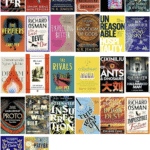Just back from Bill Thompson’s talk on the ’10 cultures problem’: a restatement of CP Snow’s famous divide between the arts and the sciences, but this time between those who understand computer code and those who don’t. (That’s ’10’ in binary or ‘2’ in decimal; I understand this because Daryl taught me about binary numbers whilst sitting around the dinner table many years ago, all of which rather pays tribute my parents’ ability to persuade clever people to talk to us.) Anyway – the point is that without an understanding of how systems work, people are powerless to make informed decisions about how those systems should be applied within society. And with computing very much at the heart of what we all do, this matters.
I don’t disagree, but I think it’s just one manifestation of a much wider and long-running phenomenon: the tension between specialisation and universality in a world where the former promises great power and the later may be the only real safeguard against its abuse. You can, after all, set up a similar ‘two cultures’ paradigm about many things – between those who understand the process of experimentation and those who don’t, between those who can use rhetoric and those who can’t, between those with mechanical engineering prowess (building, plumbing – the things I tend to call ‘real skills’ ![]() ) and those with none whatsoever. I understand that the challenge is not to turn everyone into an expert on everything but merely to be able to understand what the experts are doing, and how they are thinking, but experience doesn’t seem too encouraging.
) and those with none whatsoever. I understand that the challenge is not to turn everyone into an expert on everything but merely to be able to understand what the experts are doing, and how they are thinking, but experience doesn’t seem too encouraging.
Nevertheless, life is not binary and we don’t have to accept a straight choice between ‘expert’ and ‘know nothing’. CP Snow bemoaned the fact that an ignorance of the Second Law of Thermodynamics would not prove embarrassing to members of the literary elite, and I assume that today many people still wouldn’t have much of an idea. (Including me: I ‘know’ what entropy is in a very general sense, but I couldn’t go into many details.) But, thinking about it, perhaps there are a fair few non-scientists who would have some inkling. And in the networked age it is phenomenally easy to learn just a little bit more. Perhaps the best we can hope for is the mass curiosity, will and means to research new areas of knowledge over a lifetime: it won’t lead to everyone understanding code, but maybe just enough to discuss it at dinner parties.








Hehe, I remember the talk given by the Head of Lit at the UEA open day: he countered the criticism that the writing and study of literature is good for little by saying that since literature can be, and is, about any subject at all, writers and students of literature can be said to be experts on everything
x